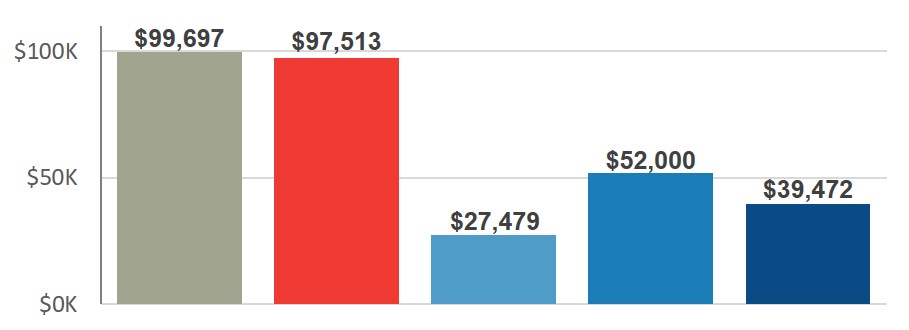
Economic Well-Being Data
At a minimum, economic well-being refers to the ability to support the basic cost of living and have the choice in how to spend financial resources. Ideally, a sense of security and satisfaction regarding personal finances, confidence to meet future financial goals, the ability to absorb unexpected expenses as well as build and maintain financial assets is also included. This page includes information on a number of influencing factors.
The trajectory of an individual’s economic well-being begins in childhood. A child raised in a family that earns the least will face challenges in moving towards a higher income level as an adult. Specifically, the odds of a child born to a family earning in the bottom one-fifth of income later earning in the top one-fifth as an adult is only 4%.
To learn more about just some of the factors that impact those odds, visit our Social Mobility page.
What’s the cost of living in Ventura County?
by United Ways of California
The Real Cost Measure (RCM) estimates the amount of income required to meet basic needs (the “Real Cost Budget”) for a given household type in a specific community. The Real Cost Measure builds a bare-bones budget that reflects constrained yet reasonable choices for essential expenses: housing, food, transportation, health care, taxes and child care.
# of Households below Real Cost Measure
61,394
% of Households below Real Cost Measure
27%
% of Households below Real Cost Measure with at least 1 Working Adult
97%
Annual Income Comparison
(based on a household of 2 adults, 1 pre-schooler, 1 school-aged child)

based on $13.00 per hour, 40 hours per week, 50 weeks per year.
| Median Adjusted HH Income | 2 Minimum Wage Jobs* | ||
| RCM Budget | Supplemental Poverty Measure | ||
| Median Poverty Threshold |
Household Budgets
| 1 Adult | 2 Adults | 2 Adults 1 Pre-schooler 1 School-aged | |
|---|---|---|---|
| Housing | $15,228 | $18,228 | $23,076 |
| Food | $4,404 | $8,064 | $12,468 |
| Health Care | $2,592 | $5,184 | $10,368 |
| Child Care | $0 | $0 | $18,708 |
| Transportation | $5,604 | $11,208 | $11,208 |
| Miscellaneous | $2,784 | $4,272 | $7,584 |
| Taxes/Credits | $5,592 | $7,276 | $14,101 |
| FINAL BUDGET | $36,204 | $54,232 | $97,513 |
Families with children face a larger barrier to economic security…
49% of households with children under six struggle, a rate much greater than that of the rest of the county.
Single mother are most likely to struggle. 63% in the county are below the Real Cost Measure.
Households of color struggle disproportionately…
Across the county, African Americans and Latinos have a disproportionate number of households with incomes below the Standard. In this area, of the 61,394 households below the Real Cost Measure, 33,000 are Latino.
Families work, but don’t earn enough…
97% of households below RCM have at least one working adult.
69% of heads of household who work are employed full time and year round.
A family of four (2 adults, 1 infant, 1 school-aged-child) would need to hold more than 3 full time, minimum-wage jobs to achieve economic security.**
High housing costs are a major challenge for struggling households…
39% of all households in the county spend more than 30% of their income on housing.
**based on $13.00 per hour, 40 hours per week, 50 weeks per year.
Education | # below RCM | % below RCM |
|---|---|---|
| Less than High School | 13,581 | 63% |
| High School Diploma or Equivalent | 14,580 | 42% |
| Some College, Assoc. or Voc. | 20,670 | 30% |
| College degree or higher | 12,563 | 13% |
| Ethnicity | # below RCM | % below RCM |
|---|---|---|
| Latino/a | 33,000 | 46% |
| African American | * | * |
| Asian American/Pacific Islander | * | * |
| White | 24,099 | 19% |
| Native American/Alaska Native | * | * |
Household Type | # below RCM | % below RCM |
|---|---|---|
| Single Mothers | 7,662 | 63% |
| Seniors | 9,932 | 20% |
| Married Couples | 25,912 | 26% |
| Informal Families | 10,962 | 26% |
Citizenship/Nativity | # below RCM | % below RCM |
|---|---|---|
| Foreign Born, Non-Citizen | 13,307 | 59% |
| Foreign Born, Naturalized | 10,224 | 30% |
| Born a US Citizen | 37,863 | 23% |
Findings drawn from The Real Cost Measure in California 2023, by United Ways of California in partnership with B3 Consults. Data calculated for this geographic profile is from 2021. For detailed methodology, visit http://unitedwaysca.org/realcost.
* For the tables above, any values which appear to be “missing” have actually been purposefully excluded due to the dataset being too small to be calculated accurately.
Disclaimer: The information displayed was created by outside data sources. All maps are for informational purposes only and should not be used for legal, engineering, or surveying purposes. The county does not warrant the accuracy of this information, and no decision involving a risk of economic loss or physical injury should be made in reliance hereon.
Employment
When workers are unemployed, workers and their families lose wages and resources. Economic and psychological stress resulting from job loss can decrease stability and harm overall well-being.
Employment is about more than just money. Job loss can sometimes bring devastating hardships for dislocated workers and their families. Disadvantaged workers, having less education and fewer marketable skills, face additional challenges to securing employment or accessing the training and education that could lead to a new job. Employers and community organizations can help by offering pathways to long-term, stable employment.
Earnings are less likely to decline without job loss
The Hamilton Project

$100 Earnings

$100 Lost Earnings

A quickly reemployed worker earned an average of $3,640 per month before job loss

One month later, $1,220 less was earned each month (an average monthly earnings of $2,420)

Two years later, average monthly earnings were $3,030 ($610 per month less than before job loss)
Steady employment protects health
Continuous, gainful employment avoids cycles of financial strain and personal stress. A worker let go at age 40 may lose 1 to 1 1/2 years of life.
Daniel Sullivan and Till von Wachter (2009)
A positive work-identity promotes emotional health
Self-worth is often tied to a person’s identity at work. Feeling productive contributes to wellness whereas job loss may lead to worsening emotional problems, increased substance abuse or staying with an abusive partner who is employed.
The American Psychological Association
Parent job stability protects child outcomes
The Urban Institute
Secure and stable family finances help to ensure that…
Enough nutritious food is available
Housing is safe
There is less stress on family dynamics
School supplies can be afforded
Enrichment opportunities are still possible
…which support positive school performance and higher job earnings as adults.
Long-term career prospects improve as the time spent unemployed decreases
The Hamilton Project
Long-term unemployment further compounds the challenges of job loss as workers become more prone to settle for jobs that pay less, underutilize their skills, or have high turnover.

20%
find work within the first 3 months of unemployment

10%
find work after 1 year
Unemployment Rates
For additional labor force and unemployment rates, select the date box and choose a month.
Low-Wage Work
In alignment with the U.S. economy, California’s unemployment rate has remained at record low levels. However, despite low unemployment, many Californian’s struggle with part-time and/or low-wage work. Young adults and workers with lower levels of education comprise a disproportionate share of low-wage workers.
To learn more about low-wage work in California – Visit UC Berkeley Labor Center.






